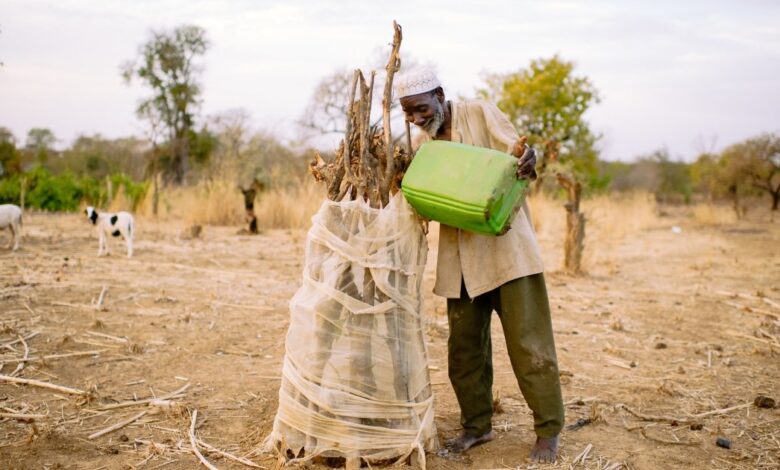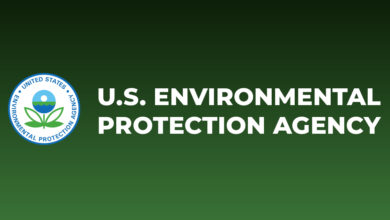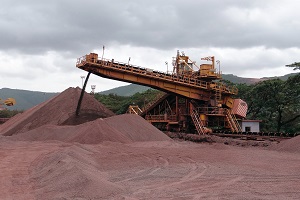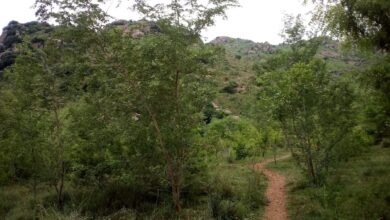WEBCAST | Natural Resources, Sustainable Development, and Peace in Africa

On June 30, 2020, the Wilson Center Africa Program, under the banner of the Southern Voices Network for Peacebuilding (SVNP), and the Social Science Research Council’s African Peacebuilding Network (APN) hosted a virtual event on “Natural Resources, Sustainable Development, and Peace in Africa.” Dr. Monde Muyangwa, Director, Wilson Center Africa Program, Washington, D.C., gave the welcome remarks; while Dr. Cyril Obi, Program Director, African Peacebuilding Network, Social Science Research Council, New York City, set the stage for and moderated the discussion. Dr. Dauda Garuba, Technical Adviser, Nigeria Extractive Industries Transparency Initiative (NEITI), Abuja, Nigeria; Dr. Resty Naiga, Lecturer and Researcher, Department of Development Studies, Makerere University, Kampala, Uganda; and Dr. Seydina Ousmane Sene, Senior Economist, Initiative Prospective Agricole et Rurale (IPAR), Dakar, Senegal joined as speakers. Dr. Cosmas Milton Obote Ochieng, Director, African Natural Resources Centre, African Development Bank (AfDB), Abidjan, Côte d’Ivoire had planned to speak, but was prevented by last-minute technical difficulties. This event examined the intersection of civil society and peacebuilding in natural resource-rich African counties. It interrogated the role of civil society in community engagement, the promotion of accountability, and development based on inclusive, transparent, and sustainable resource management. It also addressed the challenges African civil society groups have faced, lessons learned in empowering them, and how governments, private businesses, local communities, and civil society can better work together. Speakers offered policy options for boosting the meaningful inclusion of civil society groups and local communities in transforming natural resource development and management.
Dr. Garuba observed that there is a significant link between natural resources governance, development, conflict, and peace in Africa. He noted the importance of each of these links—observing that without adequate governance, peace is much more difficult to attain. Garuba asserted that a common denominator in conflicts in Africa since the Cold War has been a shift away from inter-state conflicts toward low-intensity intra-state conflicts, partly driven by competition over access to, or fueled by natural resources. He stressed that while natural resources are not the basis for all conflicts in Africa, they often play an important role in mobilizing resources to prolong violence. In assessing the roles of different actors in natural resources management, Garuba noted that governments are often seen as being aligned with private companies against the interests of the local population—leading to a lack of trust in government and a reliance on civil society to mitigate the adverse environmental impact of natural resources extraction on communities. He observed that some of the challenges faced by African institutions in addressing natural resources management and conflict include the absence of effective governance frameworks, absence of domestic resource mobilization, lack of valued-added industries, and lack of access to capital and technology. He also identified corruption and illicit financial flows, and the disconnect between national policies and regional/continental frameworks. Garuba offered several suggestions for improving natural resource governance, including the expansion of the role of civil society to build resilience in local communities, looking at domestic compliance with international instruments such as the Natural Resource Charter, and approaches such as the Africa Mining Vision, getting better deals with resource extractors, ensuring revenue transparency, and managing volatility. He underlined the importance of sustainable development—as most natural resources are non-renewable—and the need to put in place safeguard mechanisms such as voluntary principles (including those in the Extractive Industries Transparency Initiative (EITI) and the Open Government Partnership) for business, human security, human rights and the pursuit of the public good. Garuba underscored the need for civil society to continue their resilience building strategies to promote these voluntary principals; assist regional and continental organizations in pushing the African Mining Vision agenda, the Economic Community of West African States’ (ECOWAS) mineral development policy, and The New Partnership for Africa’s Development (NEPAD). He also noted the importance of creating opportunities for mediating encounters between national and local governments and local communities, strengthening the role of communities, and developing mechanisms to add value to natural resources, rather than just exporting them in their raw form and losing the opportunity to add value locally. He made a case for the sustainable extraction and use of resources for the present and future generations of Africans. Garuba closed by recommending increased collaboration between international and African civil society organizations.
Dr. Naiga provided an in-depth overview of Uganda’s resource abundance, including the recent discovery of oil.Shereiterated the importance of Africa’s natural resources not just for livelihoods but also in terms of spiritual, cultural, and historical significance—in addition to their enormous potential for sustainable development and day to day peacebuilding. However, she expressed the view that “resource curse” phenomenon has prevented the translation of these potential benefits into tangible outcomes. She dissected the various ways in which Uganda could be described as suffering from a resource curse: over 30,000 people there have been displaced since the discovery of oil with questionable resettlement arrangements, and despite abundant water supplies over 50 percent of local people lack access to clean water, in a context where competing livelihoods were driving conflicts over access to resources. She, therefore, made a case for stakeholder analysis aimed at informing conflict resolution, food security, inclusive and responsive policies directed towards ensuring that natural resource endowment benefited the people. Still looking at strategies for addressing these challenges, Naiga underlined the critical importance of governance. The role of governance is to ensure that natural resource development is inclusive and responsive to the needs of the people—without which it is not worth the risk and effort. She identified the key principles for governance as including legitimacy, accountability, transparency, and inclusiveness. Naiga asserted that achieving good governance requires engaging stakeholders, including academics and researchers to conduct studies and generate data and findings to inform evidence-based policy. She also underlined the role of civil society in advocating for inclusive governance and acting as a bridge between governments and communities, and the business sector. Engaging these stakeholders requires an enabling environment for all actors, including the recognition of the correlation between natural resource governance and sustainable development. She also interrogated approaches to natural resource management in different African countries, Naiga also observed that a key challenge behind the resource curse is the failure to ensure transparency and accountability, and make peacebuilding an integral part of natural resource management. To overcome the resource curse, she recommended integrating peacebuilding and conflict resolution into natural resource management and developing robust governance systems that are legitimate, transparent, and willing to overcome corruption. Naiga also called on decision-makers on the continent to develop home-grown strategies and capacities that would collectively reduce external dependence and pool the continent’s energies in developing the capacity to utilize resources for the benefit of Africans. She also recommended embracing the Extractive Industries Transparency Initiative (EITI), and ensuring that stakeholder analysis and engagement takes place to address conflict preemptively. Naiga also observed that most natural resource management policies are not gender-responsive, and made a strong case for integrating such considerations into efforts towards improving the quality of lives of women, and children. She also reiterated the centrality of governance to the efficient use and fair distribution of the benefits of resource endowment in African countries. While men often make decisions regarding land and water governance, women are the ones who shoulder the burden of the consequences of such decisions. It is important to develop responsive and inclusive regulatory frameworks. She closed her remarks by underlining the need for more data to inform policies, including additional funding support to reinforce research efforts.
Dr. Sene spoke to issues of water resources and land management, which are especially pressing in Senegal, but equally have relevance for many African countries. He emphasized that peacebuilding is a long-term process. In this regard, he made a strong case for developing and putting conflict prevention systems in place to prevent crises, as conflict over natural resources is likely to remain a threat to Africa’s economic development. Sene also described the Initiative Prospective Agricole et Rurale’s (IPAR’s) efforts, working in collaboration with the Government of Senegal to track the economic dimension of natural resources management and peacebuilding in Africa, particularly in relation to Senegal. He also noted that this included tracking how violence (from protests and riots to military conflict) affects peacebuilding. To this end, IPAR developed a dashboard that tracks protests, riots, and their impact on community-, municipality-, and state-level discussions and conflict. IPAR has found that over the past 10 years in West Africa, much political violence has come from civilian battles over land-grabbing, access to water, and farming and industrial practices. This research is helping to better clarify how communication of grievances at the local level can rapidly transform into violence. Sene emphasized that while it is important for officials to consider high-level policy solutions, it is also critical for them to monitor the “low intensity crises” that are occurring in communities, which can quickly escalate into full-blown violence and disrupt peacebuilding efforts. He suggested that policymakers in Africa should focus on the key trouble “hot spots” related to land grabs, farmer-herder, and water-related conflicts. In this regard, he proposed that water and land will be more critical natural resource issues in the 21st century than oil. He underscored the importance of addressing violence arising from competing natural resource exploitation and use by various stakeholders. He called for the monitoring of events across the Sahel, to help communities with information needed to build upon resource abundance and engage in appropriate kinds of natural resource-related investments. Sene also observed that conflicts over land and water resources were growing in tandem with the expansion of large-scale agribusiness in Africa. In terms of governance, he was of the view that centralized governments can be susceptible to corruption, as decisions are made by a handful of national officials who may be disconnected from communities and events on the ground—providing an easy access point for a set of corrupt actors. Sene emphasized the need for communities to have a measure of independence with which to manage their natural resources. He also emphasized the importance of addressing emerging challenges to natural resource management, noting that in Senegal there are currently 20-70 incidents of protest or political violence daily—a state of affairs that is reflected across West Africa.
In the subsequent discussion, participants posed questions via Twitter and email regarding foreign exploitation, environmental degradation, cross-sectoral collaboration, the relationship between public-private partnerships and corruption, and how communities can balance benefits from natural resources with more sustainable development.
The SVNP is a continent-wide network of African policy, research and academic organizations that works with the Wilson Center’s Africa Program to bring African knowledge and perspectives to U.S., African, and international policy on peacebuilding in Africa. Established in 2011 and supported by the generous financial support of the Carnegie Corporation of New York, the project provides avenues for African researchers and practitioners to engage with, inform, and exchange analyses and perspectives with U.S., African, and international policymakers in order to develop the most appropriate, cohesive, and inclusive policy frameworks and approaches to achieving sustainable peace in Africa.
Launched in March 2012, the African Peacebuilding Network (APN) supports independent African research on conflict-affected countries and neighboring regions of the continent, as well as the integration of African knowledge into global policy communities. It is supported by the generous financial support of the Carnegie Corporation of New York. The APN promotes the visibility of African peacebuilding knowledge among global and regional centers of scholarly analysis and practical action and makes it accessible to key policymakers at the United Nations and other multilateral, regional, and national policymaking institutions. The APN accomplishes this by facilitating the transformation of the quality and scale of African research and consolidating the contributions of African researchers and analysts, thereby connecting them with other African scholars, policy analysts, practitioners, and networks focusing on issues of peacebuilding, as well as with other policymaking communities around the world.
This event was livetweeted and webcast. Follow the Africa Program Twitter account @AfricaUpClose and the African Peacebuilding Network’s Twitter account @APN_SSRC and catch up on the conversation #NaturalResources
Selected Quotes
Dauda Garuba
“Conflicts are a factual construct of life, and one common denominator that we’ve seen since after the Cold War is a radical shift from interstate conflict and ideological positions into what we would call internal proclivities that we have seen in terms of resources, both renewable and nonrenewable natural resources. One key denominator as well is the fact that …the conflicts we find in Africa today are not directly linked to natural resources. Most of them are tied to natural resources by way of the fact that warlords tend to mobilize the resources from targeting certain territories. They mobilize the natural resources in their territories and use it to purchase arms and ammunition, which advance their fight.”
“The fact actually remains that if any of the African countries that are rich in natural resources are going to transform or transcend conflicts, they are not to perpetually remain on the side of trying to quench the fire. There is a need to look at the governance framework…. It doesn’t matter if the governance framework is a borrowed idea, but the fact is that it has to be retooled in such a way that it works with existing realities in the various countries. For me, the government framework is largely about transparency and accountability. It’s largely about pursuing the general good for the people.”
“We have not built a continent that could survive outside of natural resource exploitation and transaction, and that is why you find in almost any country that is rich in natural resources, there is no job other than those which exploit and sell, and the money becomes an issue of contestation among political elites.”
Resty Naiga
“Governance has a role to play in terms of ensuring that natural resource management is inclusive and responsive to the needs of the people. Without that, then it’s not worth the risk and effort.”
“98 percent of the water users were facing conflicts on a weekly basis, but 91% reported lack of conflict resolution mechanisms, and conflicts were hindering contribution towards water provision … the key challenge to lack of access to safe water was not a lack of water, but how water is governed. It was a governance question. Similarly it comes to learn with the discovery of minerals in Uganda, people have been displaced with poor resettlement and compensation plans.”
“The policies do not seem to be gender responsive, even when policies are well articulated about participation of different sections of the population, such as women and men, women largely continue to miss in this scale. For instance, we see this during land compensation in the Albertine region [in Uganda], men take decisions thoroughly, without participation of women, but women carry the burden of the displacements, of the settlements, of food security, lack of water. Women carry the burden, but they are not included. We need a responsive and inclusive regulatory framework.”
Seydina Ousmane Sene
“When we talk about peace, I think peacebuilding is a long process and the process has to be really nurtured, but also the systems have to be put in place to prevent crisis happening again as it was in the past ten years. Africa is rising yes, but there are still spots that can still contain conflicts that might jeopardize the evolution of economic development that Africa is taking right now, especially in this difficult time.”
“In the past ten years, there is severe political violence that we have observed in West African countries especially, they are always coming from civilian battles against land-grabbing, civilian battles against access to water, civilian battles against farming practices and big farmers and the industry taking land from them. What we documented about this process in the past five years is about how we moved rapidly from communication about dissatisfaction from the community to an eruption of political violence in the country.”
“In order for people to benefit from the natural resources in the community, the municipality has to have the independence to manage their own resources. In most of the West African countries, communities and municipalities do not have that power. Municipalities have now demanded that they need the technical resources and the human resources to be able to manage their resources. In order for the community to engage with the municipality in a meaningful way, knowing their city, knowing their community, they have to be empowered, they have to be educated, but they also have to have a clear map of the natural resources in the community and how they can benefit from that.”
Event cosponsors:




